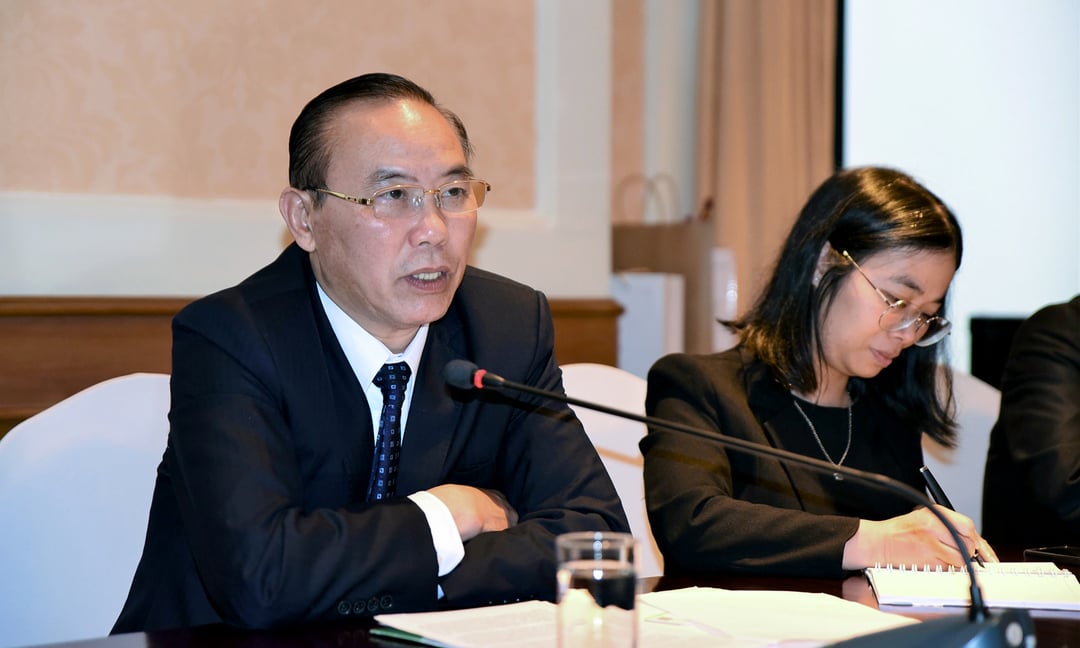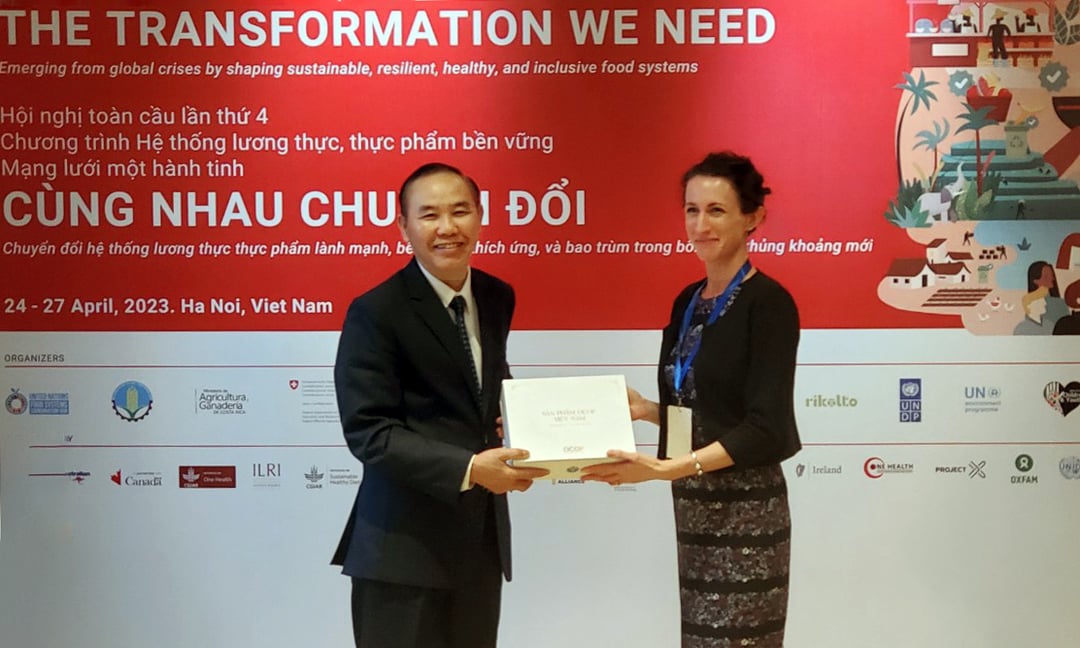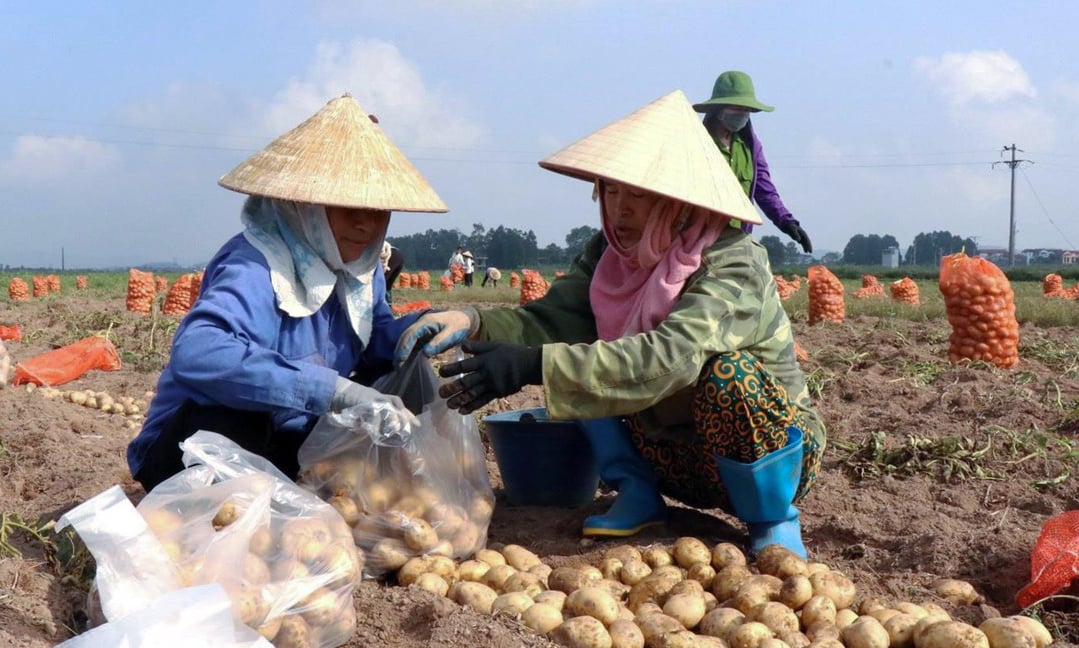May 22, 2025 | 13:29 GMT +7
May 22, 2025 | 13:29 GMT +7
Hotline: 0913.378.918
May 22, 2025 | 13:29 GMT +7
Hotline: 0913.378.918

Deputy Minister Phung Duc Tien discussing with Grow Asia representatives about system development orientations on the sidelines of the fourth Global Conference on Sustainable Food Systems. Photo: Pham Hieu.
Opening the working session, Deputy Minister of Agriculture and Rural Development Phung Duc Tien emphasized the importance of science and technology on the journey of agricultural development. According to the Deputy Minister, science and technology contribute over 30% of the added value of the agricultural sector and particularly 38% in the production of plant varieties and livestock.
Once held the position of Vice Chairman of the National Assembly Committee for Science, Technology and Environment for two terms, Deputy Minister Phung Duc Tien emphasized the important contribution of science and technology especially in improving productivity, quality and competitiveness of agricultural products in the domestic market and international markets, contributing to bringing Vietnam into the group of leading exporting countries in the world.
Currently, some of Vietnam's commodity groups (black pepper, rubber, cashew, rice, seafood, etc.) are among the top in the world. The Deputy Minister believed that science and technology are the keys that help the agricultural industry better respond to climate change and transform the food processing system. And since Vietnam is currently a major food supplier to the world, the Deputy Minister pledged that the entire agricultural sector will continue to actively contribute to global food security.

Deputy Minister Phung Duc Tien presents gifts to Mrs. Erin Sweeney. Photo: Bao Thang.
One of the future key tasks set by the leaders of the Ministry of Agriculture and Rural Development is to promote the establishment of the Food Innovation Hub, associated with the development of green, low-emission agriculture. This is the first center in Southeast Asia to conduct in-depth research in this field. "The center will promote products to develope in chain, helping Vietnam take one step closer to the goal of being a powerhouse in agricultural products with sustainable added value," said the Deputy Minister.
Endorsing the idea of Deputy Minister Phung Duc Tien, Mrs. Erin Sweeney, the Program Director of Grow Asia, highly appreciated Vietnam's role in the South-South Cooperation. Vietnam's experiences in building the Food Innovation Hub will be replicated in countries in Africa and Latin America.
Grow Asia has developed public-private partnerships in agriculture. Inspired by the idea of Vietnam, the organization has formed a multilateral fund, including many donors, with a current budget of approximately USD 3 million. This investment will be dedicated to the innovations in the food processing system.
"Together we will transform the food processing system towards a healthy, sustainable, and climate-resilient way. I hope that the Ministry of Agriculture and Rural Development will coordinate with Grow Asia to issue activities to implement into practice," said Mrs. Sweeney.

The farmer harvests potatoes in the field. Photo: Pham Hieu.
According to the Director of Grow Asia, coffee is the most successful example of the public-private partnership in Vietnam. Through a meeting with a representative of the Ministry of Agriculture and Rural Development, Mrs. Sweeney wished to listen to some suggestions about potential categories to conduct investment research in the future, besides rice and livestock.
With the desire to raise the value of Vietnamese agricultural products, the Ministry of Agriculture and Rural Development proposed a group of fruit and vegetable products, which is a commodity industry with an export turnover of USD 3.34 billion in 2022. Among these products, mango, durian and potato were highlighted by the leader of the Ministry of Agriculture and Rural Development as development spearheads.
Previously, in early March 2023, the Ministry of Agriculture and Rural Development coordinated with Grow Asia to establish a public-private partnership working group for the rice industry, co-chaired by the National Center for Agricultural Extension and Bayer Vietnam Co., Ltd.
One of the key tasks of the group is to research and propose a strategy for the development of the rice industry. In particular, the group will participate in a scheme for sustainable production of 1 million ha of high quality rice cultivation in the Mekong Delta
From August 2020 Grow Asia was officially recognized as an ASEAN organization. This was also the first partnership network initiated by the World Economic Forum (WEF) receive recognition from ASEAN. This allows Grow Asia to submit statements, recommendations and views on policy issues or regional issues to the ASEAN Secretariat.
Grow Asia aims to connect farmers, representatives of government agencies, the private sector, Non-Governmental Organisations and other stakeholders in Southeast Asia to improve productivity, profitability and environmental sustainability of the agricultural sector in the region.
This organization currently cooperates with more than 500 partners organized into 46 public-private partnership (PPP) groups, in 18 industry groups and 8 interdisciplinary issues in 6 partner countries in Cambodia, Indonesia, Myanmar, Philippines, Papua New Guinea and Vietnam, supporting nearly 1.8 million smallholder farmers.
The Partnership for Sustainable Agriculture in Vietnam (PSAV) is currently one of six national partner networks supported by Grow Asia under the Agriculture Vision Initiative of the World Economic Forum's (WEF).
Translated by Bao Ngoc
![Reducing emissions from rice fields: [2] Farmers’ commitment to the soil](https://t.ex-cdn.com/nongnghiepmoitruong.vn/608w/files/news/2025/05/05/dsc08881jpg-nongnghiep-140632.jpg)
(VAN) Clean rice cultivation model in Thuong Tan commune, Bac Tan Uyen district, is assisting local residents in achieving sustainable agriculture by substantially reducing costs, increasing productivity, and protecting the environment.

(VAN) At the conference to disseminate Resolution No. 68, AgriS introduced its digital agricultural ecosystem and reaffirmed its commitment to accompanying the Government in promoting private sector development and sustainable agriculture.

(VAN) 'Blue Ocean - Blue Foods' initiative is designed to restore marine ecosystems and establish sustainable livelihoods for local communities by cultivating a minimum of 1,000 hectares of cottonii seaweed in the first three years.
/2025/05/21/4642-3-112707_603.jpg)
(VAN) The V-SCOPE project has made direct contributions to three out of six pillars of the Comprehensive Strategic Partnership between Vietnam and Australia.

(VAN) Facing the threat of rabies spreading to the community, Gia Lai province urgently carries out measures to vaccinate dogs and cats on a large scale.

(VAN) Disease-free livestock farming not only protects livestock herds but also stabilizes production and livelihoods for many farmers in Tuyen Quang.

(VAN) Japan's grant aid project contributes to capacity building, promoting organic agricultural production, and fostering sustainable community development in Dong Thap province.